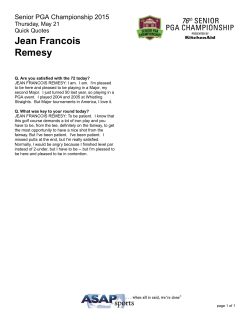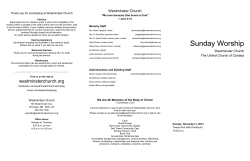
HW CWL statement on CNWL Quality Account 2014/15
CNWL Quality Account Healthwatch Central West London Statement Healthwatch Central West London welcomes the opportunity to provide this statement on the Central and North West London (CNWL) NHS Foundation Trust Quality Account for 2014/2015, and to comment on the quality of the services commissioned locally to meet the mental health needs of residents and service users in Kensington and Chelsea and in Westminster. We are pleased to have been able to engage with the Trust this year in a variety of ways such as at quarterly Healthwatch meetings, monthly Kensington, Chelsea and Westminster meetings, our Dignity Champions work and through co-produced mental health redesign workshops. Our members look forward to working with CNWL on the new borough based visions to achieve enhanced quality and service delivery objectives. We welcome the Trust’s efforts to take our feedback on accessibility on board. However, we feel that there is room to significantly improve the clarity of the information provided, and we hope to see the impact of laudable initiatives such as the Trust’s Plain English campaign in the final version of the QA. 2014-2015 Performance We are pleased to note the recent successes and service improvements as listed on the K&C and Westminster overview pages. In line with our findings on mental well-being in schools, we are particularly pleased that K&C has been chosen as a pilot borough to raise mental health awareness in schools, including the possibility of performing plays based on mental health scenarios. We would like to offer our congratulations to Dorcus Fatwa on receiving a Nursing Standard Award for her work with young people and families affected by gangs in Westminster. We are delighted to note the successful Enhanced Reconnections service for homeless in being expanded from Westminster in to St Charles. The success of the Personal Health Budgets pilot is pleasing. However, we would suggest there is a need locally for a peer support personalisation initiative to support service users to optimise use of their ASC Personal Budgets and Personal Health Budgets. Our members welcome the roll out of the secondary care employment support initiative in K&C, but we would like further clarification on the commissioning process for primary care employment. We share the disappointment of St. Charles staff and of the Trust Board in the repeated failure of the services in the St. Charles Mental Health Unit to meet all six of the quality standards in recent Care Quality Commission (CQC) inspections. 1 Whilst we are pleased the requirement for enforcement action has been lifted at 3 Beatrice Place, we are disappointed that this facility is still not meeting the CQC standard for ‘providing care, treatment and support that meets people’s needs.’ In addition to the findings of our ‘enter and view’ visit to St Charles, and as part of the CQC consultation process, Healthwatch flagged concerns about: Discharge planning in the Trust The lack of welcome packs on wards The poor involvement of carers in care planning and service delivery The significant level of DNAs to the CaMHS service and the lack of any follow up Reduced local bed provision Poor access to physical health assessments Poor staff/patient relations during our visits to St Charles Impact of the CaMHS delays on people with autism Low numbers of staff appraisals Sleepovers/sleep-outs (patients without dedicated beds) in St Charles Wait for beds We are disappointed about the closure of the Max Glatt detox unit in Chelsea, and we are keen to monitor how provision for this client group will be met in its absence. The national Community Mental Health Survey Report (September 2014) found disappointingly poor results for CNWL in seven areas (where performance has deteriorated by more than 5%) and only two areas where performance has actually improved (by more than 5%). Healthwatch members are particularly concerned about the challenge of meeting significant financial efficiency targets in K&C and in Westminster this year. With the redesign due to be completed by 2016, we fear the quality of provision is in danger of being undermined. Members are anxious to find out further detail on the future of the Home Treatment Teams (HTT) in both boroughs and we hope CNWL will start clear and honest engagement on this work with service users and their carers via our Healthwatch network. Priorities 2015-2016 Priority 1- Patients report feeling definitely involved as much as they wanted to be in decisions about their care or treatment. We concur with the Trust in considering this to be a priority of great importance in the coming year. The Trust has not shown the improvements we had hoped for in this area (page 10). Further to the provisions of the Care Act, it is essential that patients receive personalised care, with control and choice of care and treatment options. It is important that CNWL (through the Care Coordinator) engages the patient on what is on offer from the 2 multidisciplinary team, what therapies and other services are available, including those services offered in the third and private sectors. We would welcome a more detailed update on the K&C personal health budget pilot flagged on pages 28-29. Priority 2- Patients report their care or treatment plan helped them achieve their personal health or daily living goals. Our members are pleased that the Trust has chosen to prioritise this area next year as we had identified room for improvements in our mental health care plan report and QA statement last year. This priority should include data on the patient’s involvement in setting and achieving their recovery journey, along with the views of carers. This year we have researched our local CaMHS provision and we are pleased to note that during our visit to Collingham Children’s Centre, all of the young people (and parents) whom we spoke with had knowledge of their care/treatment plans and felt involved in the creation of it. However, access to the Collingham and the pressures of efficiencies on staff continue to be of significant concern. Priority 3 Carers report that they felt appropriate involvement in the care and treatment planning for their loved ones. We commend the trust efforts to improve carer involvement and we do see it as an important priority as carers frequently report feeling left out. It is important that all relevant staff are made aware of the need to require service user consent for carer involvement. We would welcome further clarification on the users and carers involvement strategy mentioned in the draft report including how Healthwatch could collaborate with CNWL on this area (page 80). Physical health and safety Our members also want to reiterate the importance of treating people holistically by taking into account both their mental and physical health and wellbeing in a safe environment. We are pleased that an audit of physical health monitoring for inpatients in adult psychiatric wards has shown good results. However, recording is still patchy and we would welcome a clear action plan to reflect this problem. In our statement last year, we expressed significant concern over the poor performance of the Trust on patients’ perceived safety in the clinical setting. Unfortunately, the situation has not improved since. Our members are extremely concerned about bed pressures particularly in St. Charles Mental Health Unit. Although, the NHS West London Clinical Commissioning Group has temporarily commissioned 5 Extra Contractual Referral (ECR) beds in the east end of London, out of borough placements are far from an optimal solution. We are particularly concerned that this is happening so soon after local acute bed closures, and we are patient stories about sleeping on sofas and moving late at night, 3 just to be returned to acute wards in the morning. This is an extremely distressing experience for a mental health inpatient and cannot be conducive to feeling safe or recovery. Thus, we are also most concerned about the possible reductions in Home Treatment Teams (HTT) staff numbers across KCW. It is likely this service is taking the strain of bed pressures. The HTT staff consultation was completed in December but our members are still waiting to be engaged. Local triage and 24/7 Home Treatment Teams are the lynchpin to the success of any Single Point of Access in the service re-design planned for our boroughs. Whilst we welcome the expansion of primary care services and facilities in K&C it is concerning that CNWL is struggling to recruit a high calibre of skilled and motivated staff across the services. We appreciate that CNWL is looking at targeted recruitment strategies to rectify this and we will welcome frequent updates on this issue. This uncertainty causes instability for patients and a reallocation of caseloads for staff. Further, we are concerned that whilst the Gordon Hospital operates a walk-in service for Westminster residents, K&C residents need to present at A&E at St Mary’s, Paddington or at the Chelsea & Westminster Hospital for assessment in case of crisis. We are pleased that the percentage of patients having a number to call in case of crisis has increased since last year, but we would welcome further improvement in this area, as well as an explanation on the gap existing among out two boroughs. We also welcome the place of safety working party update report as presented to RBKC ASC and health committee in Jan 2015 with partnership working from CNWL, RBKC, WLCCG and NWL MH programme board. Going forward Our members are especially keen to learn of the Trust’s progress on Strengthening its learning culture, one of the areas for consultation this year. Organisational learning should be based on a triangular process between service users, professionals and carers and be promoted by initiatives such as the Recovery and Wellbeing College. This should lead to the full adoption of a co-produced model for both individual care and service development. We are particularly looking forward to the establishment of local QA development meetings, where local performance data can be accessed and local priorities across KCW developed and monitored on an ongoing basis. At a time of real financial and operational pressures, we would appreciate greater commitment to transparency and openness at Board meetings and key decision making fora to enhance collaboration going forward. We are most concerned the 20% savings targets is driving reform and creating restrictive criteria as opposed to the shift to person centred outcomes. We are also disappointed that the Head of Patient and Public Involvement post has been vacant for four months, as we feel that a strong lead is needed for improved engagement. 4 In conclusion, we look forward to continuing to work in partnership with Central & North West London NHS Foundation Trust to achieve better quality and engagement. Healthwatch Central West London has raised several concerns over the year including bed pressures, Home Treatment Team's and access to services via its seats on the Health and Adult Social Care Overview and Scrutiny Committee and on the Health and Wellbeing board and will continue to do so in the coming year. This year we plan on carrying out a number of visits to Central North West London NHS FT services as part of our Dignity Champions project, and we hope that the Trust will make effective and timely use of the results. Contact: Luul Balestra Healthwatch Kensington and Chelsea Borough Manager Phone: 020 8964 1490 Email: luul.balestra@hestia.org Date: 08/05/15 5
© Copyright 2025










